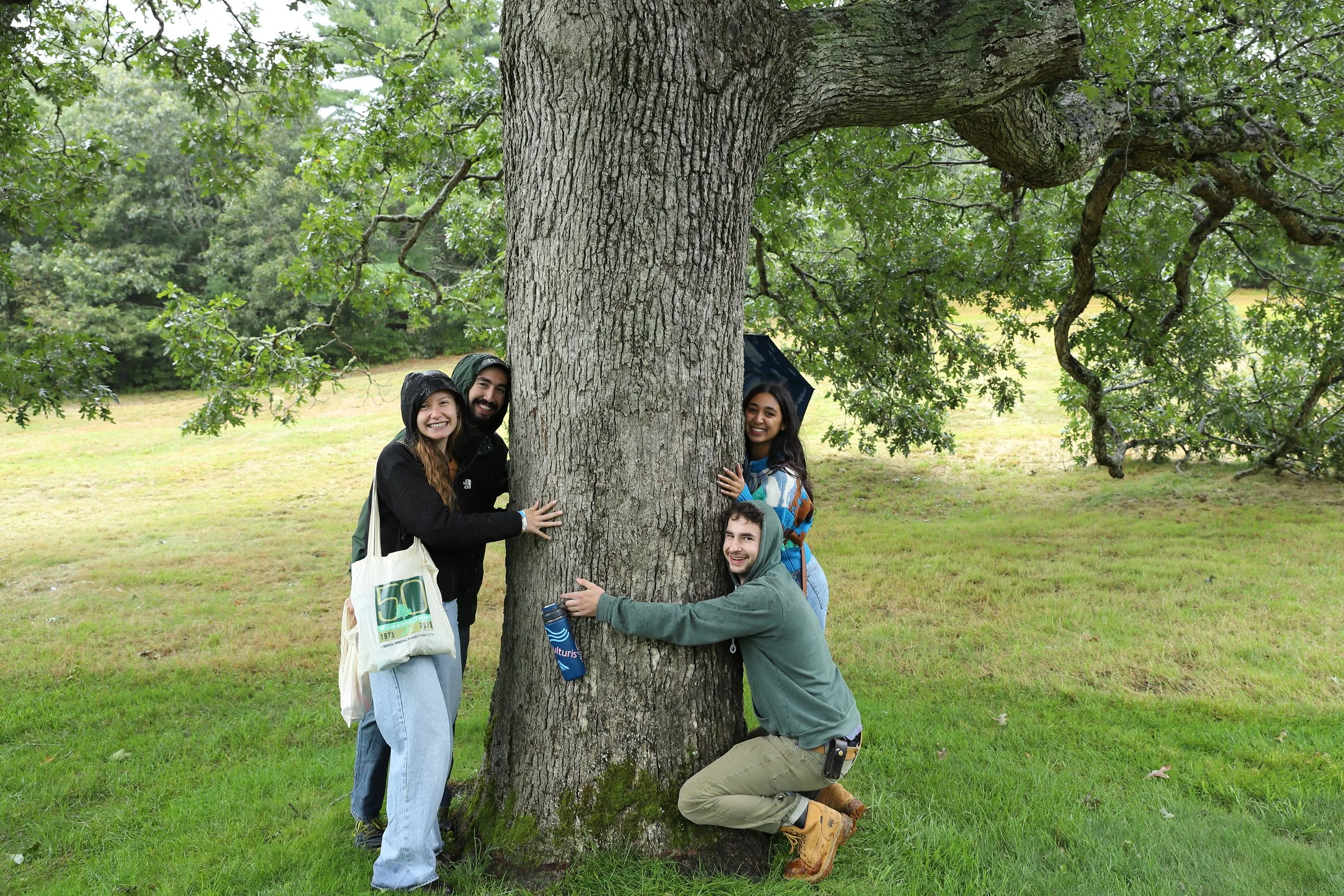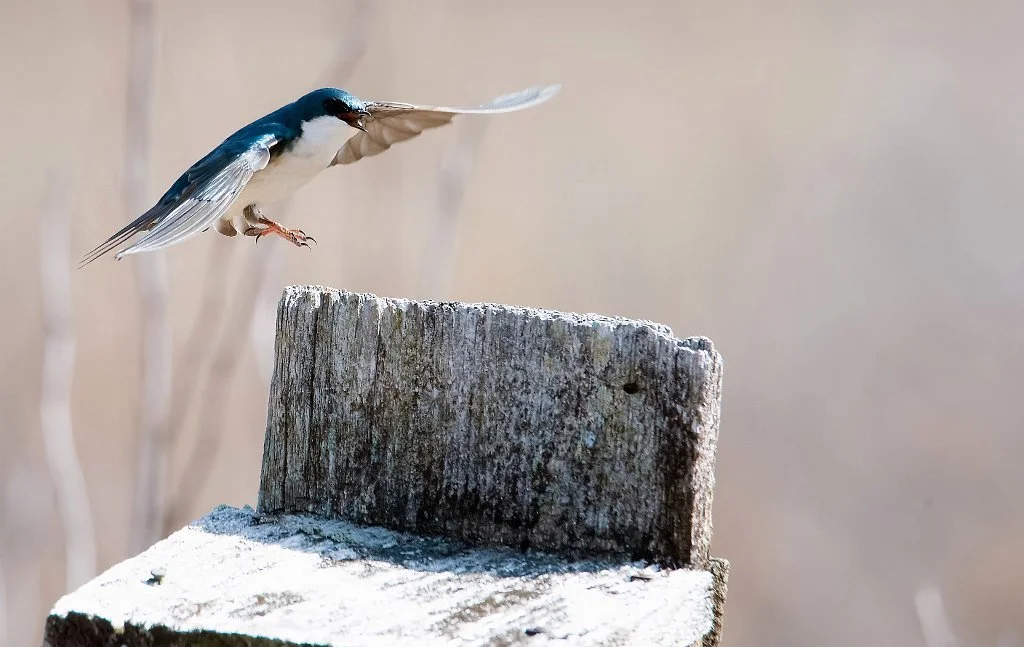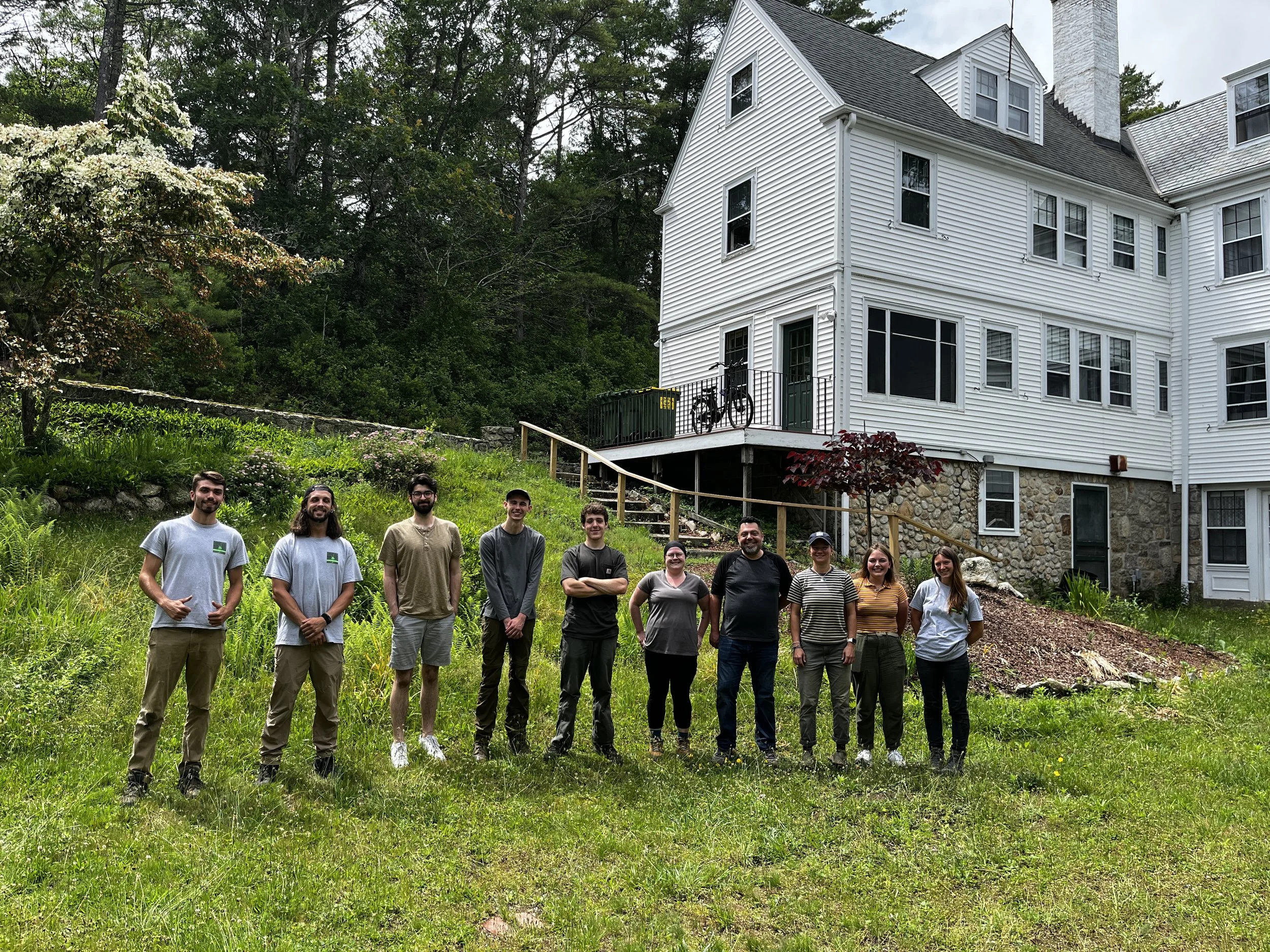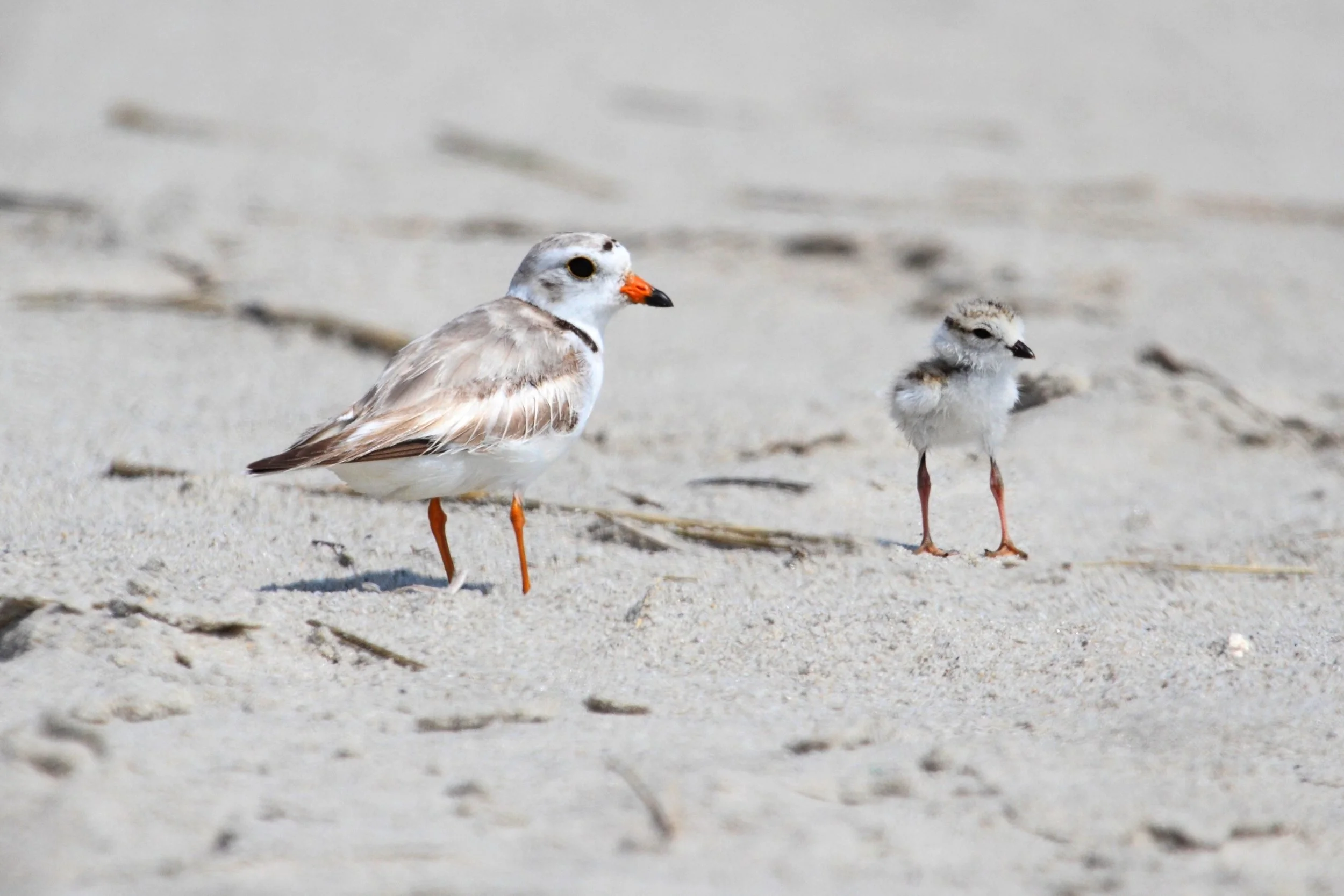What’s New at Wildlands
Solstice Celebration: Let’s Show Up for the Region’s Lands and Waters
Attendees of Wildlands Trust’s 50th Anniversary Celebration in 2023 embrace the ancient white oak tree at Davis-Douglas Farm in South Plymouth. (Photo by Paul Carey)
By Thomas Patti, Communications Coordinator
(This piece first appeared in the Plymouth Independent.)
For a bird lover like me, the view from my office window is a blessing and a curse. A blessing because the full diversity of avian life on the South Shore—warblers and waxwings, hummingbirds and hawks, bluebirds and bald eagles—visits with enough regularity to call them coworkers. A curse because these coworkers are highly distracting, with flagrant disregard for the rhythms of a nine-to-five workday.
Luckily, I work for Wildlands Trust, a nonprofit organization with sympathy for those who wander. Founded in 1973, Wildlands Trust is one of the state’s oldest and largest land trusts, protecting and stewarding the natural places that make Southeastern Massachusetts a remarkable place to live, work, and play. Our headquarters at Davis-Douglas Farm is a hidden gem tucked within a vast expanse of globally rare forest and pond habitats in South Plymouth. Outside my window, a pollinator garden, wildflower meadow, and secluded woodland converge to form a hotspot of natural beauty, punctuated by the iconic water tower on Long Pond Road.
If you visit Davis-Douglas Farm this spring, the first birds you’ll likely see (but certainly not the last) are tree swallows. The iridescent blue backs of these sparrow-sized songbirds will catch the sunlight and your eye as they bank, swoop, glide, twist, and turn in flocks of dozens over the wildflower meadow, snapping up insects on the wing. Catching enough bugs to fuel their acrobatic frenzy is a full-time job. In fact, they rarely seem to land.
A tree swallow landing on a nest box. (Photo by Rob MacDonald)
Sometimes, the social and environmental challenges of our time can feel like those tree swallows, swirling in our minds and clamoring incessantly for our attention. In the news and on social media, rage, despair, and misinformation startle our anxieties up to the sky and offer them no place to land—no way to stand up for our beliefs, defend our values, or effect positive change.
On the issue of the environment, Wildlands Trust is a place to land. We know that most people don’t have the time to take the preservation of our region’s natural health and beauty into their own hands. But we also know that most people share our vision for the future of Southeastern Massachusetts. A resounding majority of Americans, regardless of political affiliation, support the expansion of natural climate solutions, such as protecting forests and restoring coastal wetlands. In Massachusetts, a national leader in environmental protection, over two-thirds of residents think we need to do even more to conserve land, water, and wildlife habitat.
With such broad public support for conservation, the accelerating loss of natural land across the state and country can make grassroots efforts feel hopeless. It's true that we face an uphill battle. Far too often, the fate of our beloved lands and waters is decided behind closed doors, at tables where money determines the size of your seat and the volume of your microphone.
Wildlands Trust is your chair at those tables. It may be a lawn chair. But with 52 years of experience serving 59 cities and towns, Wildlands Trust knows how to leverage every dollar and every show of support into a case for nature that money can’t buy off. The more members we represent, the better our case. Together, our voices are too loud and our vision is too strong to ignore.
On Saturday, June 21, the Wildlands Trust Solstice Celebration at Davis-Douglas Farm will have something for everyone—music, food, hikes, crafts, raffles, and more. It will also serve as an undeniable testament to the size and strength of the regional conservation community. Let's come together to make a resounding statement that nature is non-negotiable in the future of our region. Whether you're a longtime member or just now learning about Wildlands Trust, here is your chance to show up for the lands and waters of Southeastern Massachusetts—and celebrate the start of summer with family, friends, and neighbors.
When the tree swallows of Davis-Douglas Farm finally run out of steam, they find refuge in a row of bird boxes on the meadow’s edge. Here, they escape the heat, rest their wings, and tend to the next generation. Later this month, people across the region will descend on Davis-Douglas Farm to do the same. Wildlands Trust can’t help with all the worries flying around your head. But your passion for the natural world is safe with us.
Seasonal Land Stewards Hone Skills at STC
By Thomas Patti, Communications Coordinator
Late last month, our burgeoning Stewardship Training Center (STC) reached a major milestone in its mission to build land stewardship capacity across the state.
On June 26 and 27, Wildlands Trust hosted its first Seasonal Land Steward Training at the STC. Ten trainees, each holding a land stewardship role this summer with a city, town, or environmental nonprofit, converged on the STC from across Massachusetts to gain invaluable conservation skills and expand their professional network. The program, reviewed positively by participants, marks the first in hopefully a long line of initiatives at the STC to support the sustained care of conservation lands, especially during peak periods of human use.
“I am extremely excited to have had the opportunity to bring this group of seasonals together,” said Wildlands Stewardship Coordinator Zoë Smiarowski. “I think all of the participants worked extremely well collaboratively and learned from each other and the instructors in the most positive way.”
The training began bright and early on Monday morning with a group hike and trail maintenance workshop at our Halfway Pond Conservation Area, the setting of the STC. Leading the workshop were Mary Doucette of the Buzzards Bay Coalition and Colleen Andrews of Mattapoisett Land Trust. Around midday, Mary and Colleen were joined by Zoë to teach trainees how to care for stewardship tools. After lunch, trainees honed their invasive plant identification and removal skills through a presentation and hike led by Kelly Barber of Barnstable Land Trust.
Kelly Barber of Barnstable Land Trust leads an invasive plant identification walk.
On Tuesday, Chris Crowther of Certified Rescue Courses trained program participants in first aid and CPR. Trainees then learned to build wooden benches during a carpentry workshop led by Wildlands staff. Finally, Nate Cristofori and Michael Cahill of the Plymouth Department of Marine and Environmental Affairs presented to the group about interacting with the public on conservation land.
“I look forward to continued and new collaborations with the wide range of talented conservation professionals and volunteers in the region,” Zoë said about the STC. “I feel extremely fortunate to be a part of the community here in Southeastern Massachusetts and I'm excited to see all the creative projects that come together for the betterment of our lands and waters.”
Thank you to all who attended our program, and to the guest instructors for providing their passion and expertise! Wildlands Trust looks forward to working with these and new partners as the STC marches forward in its first full year of operation.
To learn more about the STC and browse upcoming events, visit our Training page.
Click through the gallery below to view more photos from the 2023 Seasonal Land Steward Training.



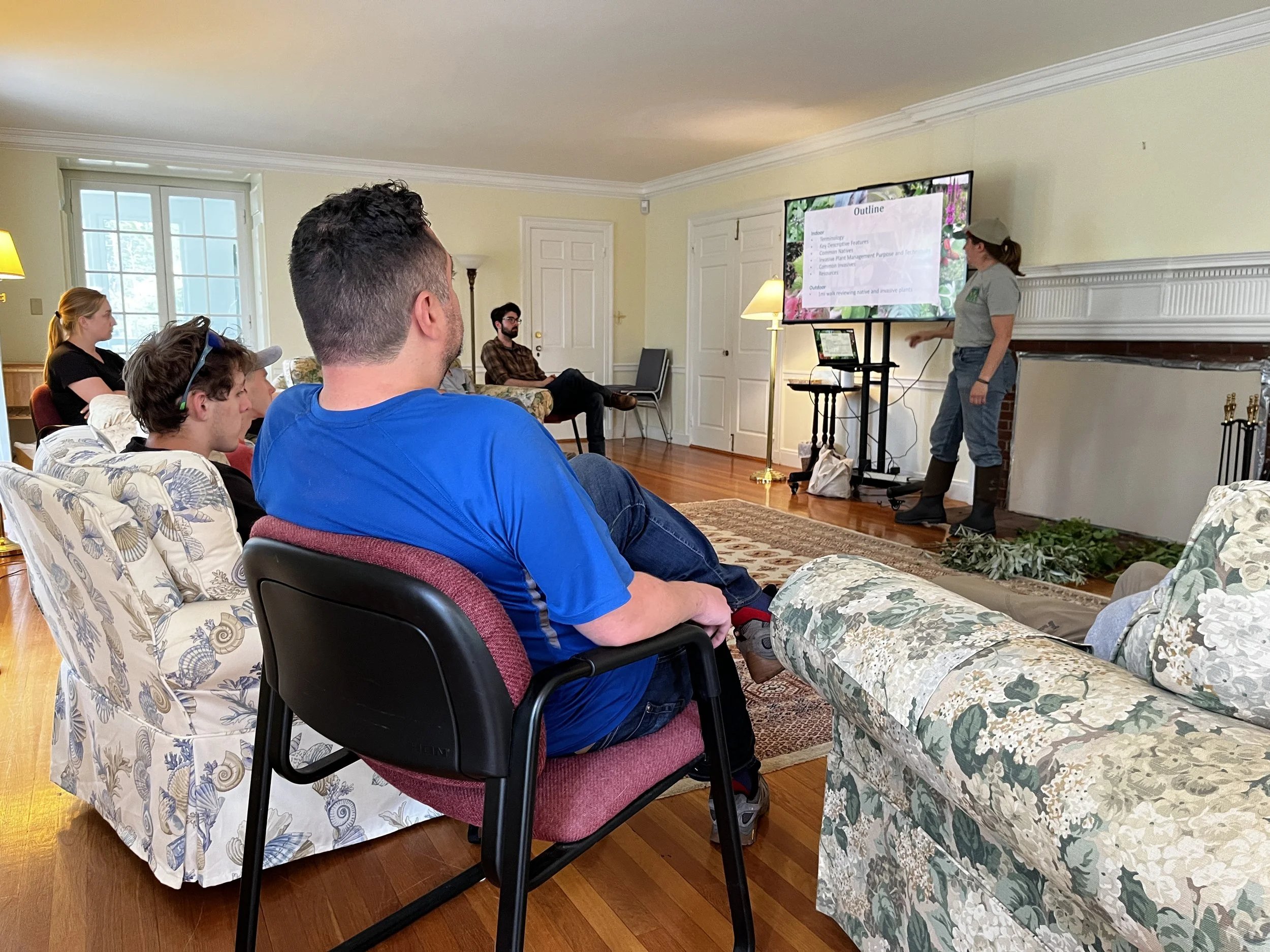
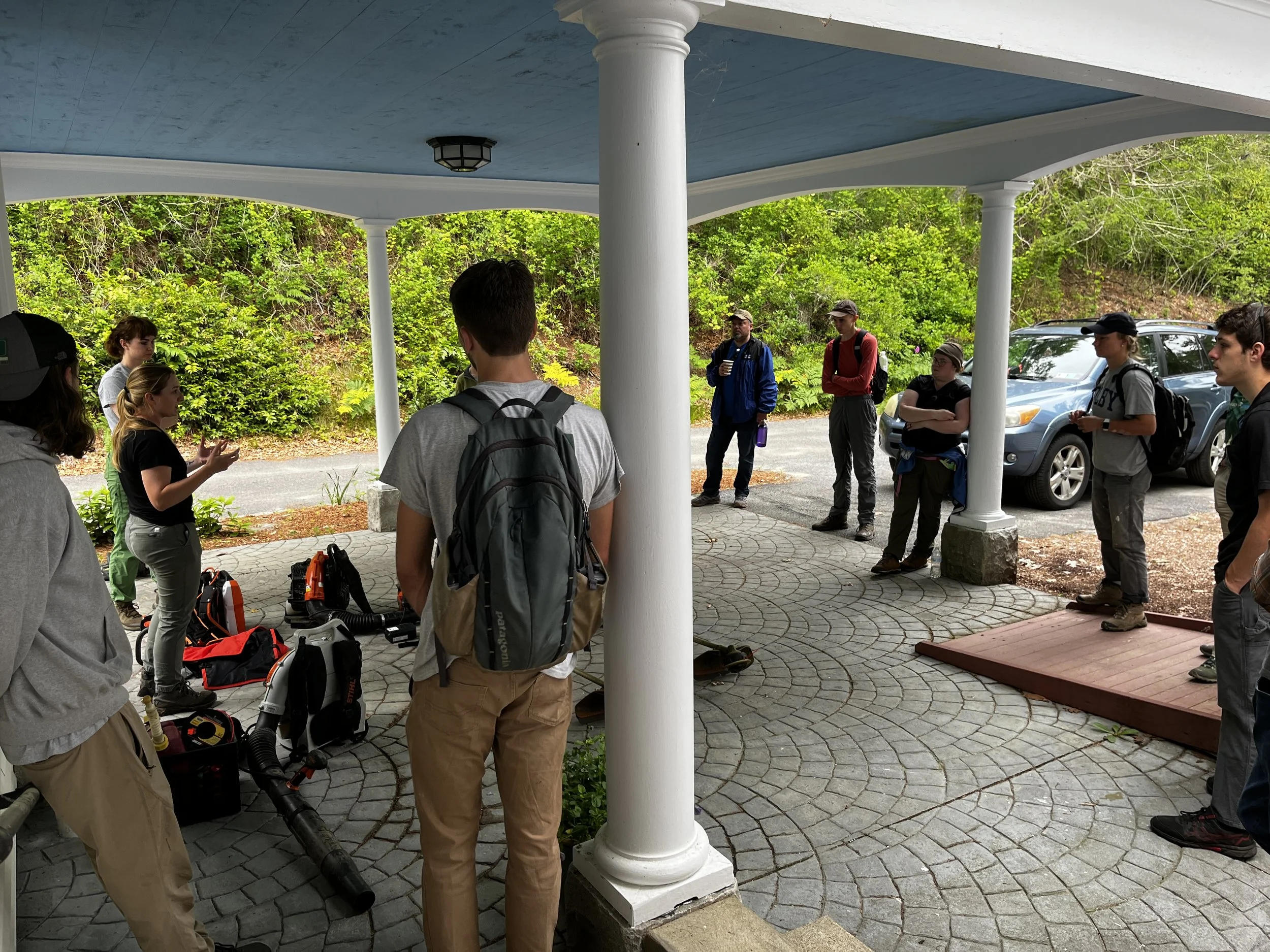








Corporations for Conservation: Wildlands Trust Gets South Shore Businesses Outdoors
Creative cross-sector partnerships a win-win-win for ecosystems, communities, team morale
By Thomas Patti, Communications Coordinator
REI Hingham and Wildlands Trust staff pose outside of the Stewardship Training Center in Plymouth.
FOR IMMEDIATE RELEASE
Plymouth, MA — On April 19, Wildlands Trust welcomed REI Hingham staff to its new Stewardship Training Center (STC) in Plymouth for a volunteer workday. Wildlands Trust is eager to engage more corporate partners in conservation and community service as the STC embarks on its first year serving land stewardship volunteers and professionals from across the state.
The April workday marked REI’s fourth volunteer engagement with Wildlands Trust, including its third at the STC. Paul Vicino, softgoods lead at REI Hingham, began organizing the staff outings when similar company-led events were phased out.
“I was already a volunteer with [Wildlands Trust], so I thought I could get some people to help with the new trails,” Vicino said. “We also wanted to celebrate Earth Day while giving back to our community.”
Among other tasks, the REI staff completed gardening projects around the STC and helped build new walking steps between two trails.
“It’s a good team-building and community-building activity,” added Debbie Hill, operations lead at REI Hingham. “The staff that participates feels connected, and we talk while we’re doing it and get to know each other a little better. All of us who work at REI know how important it is to help be good stewards of our environment.”
REI Hingham and Wildlands Trust staff complete gardening projects at the Stewardship Training Center.
The STC, acquired by Wildlands Trust in 2022, sits within a 460-acre conservation area surrounding Halfway Pond in South Plymouth. Wildlands Trust aims to work with town, state, nonprofit, and corporate partners at the STC to advance skill development and address land stewardship needs throughout Massachusetts. To learn more about the STC, visit wildlandstrust.org/training.
“I appreciate the enthusiasm you all bring to our trails,” Vicino concluded. “Not to mention lunch. We’ll do something again with Wildlands, for sure.”
To schedule a corporate workday at the STC or a different Wildlands Trust preserve, contact Stewardship Coordinator Zoë Smiarowski at zsmiarowski@wildlandstrust.org or 774-343-5121 x109.
About Wildlands Trust: Wildlands Trust is one of the largest and oldest regional land trusts in Massachusetts. Since 1973, the Plymouth-based nonprofit has helped protect nearly 14,000 acres of natural and agricultural land across Southeastern Massachusetts, keeping local communities healthy and connected to the natural world. Visit wildlandstrust.org for more details.
###
Seasonal Restrictions in Effect at Shifting Lots Preserve
By Thomas Patti, Communications Coordinator
Symbolic fencing at Shifting Lots Preserve. Photo by Jerry Monkman.
Shifting Lots Preserve in Plymouth could be considered prime real estate for people and wildlife alike. For people, the warm sand, cool waters, and quintessential South Shore views make the Wildlands Trust property and adjacent Ellisville Harbor State Park a can’t-miss summer destination. For wildlife, the preserve’s salt marsh estuary, sand dunes, and migrating barrier beach provide crucial habitat to an intricate web of aquatic and terrestrial species. Ensuring that Shifting Lots remains a place for all species to enjoy requires seasonal adjustments to how we humans engage with the property.
In late March, volunteers and staff from Wildlands Trust and the Friends of Ellisville Marsh installed symbolic fencing around the historic nesting area of Piping Plovers within the preserve. This fencing, composed of simple wooden stakes and twine with bright-colored educational signs, may not provide much of a physical barrier between shorebirds, people, and predators, but it can help alert beachgoers to the small, sandy-colored birds that are otherwise almost impossible to spot. Alongside habitat loss from beachfront development and predation from gulls, raccoons, and other species attracted to nest sites by food waste and garbage, Piping Plovers face death and nest failure from more direct human conflict, including pedestrians and offroad vehicles trampling eggs and unleashed dogs frightening parents and chicks. Consequent population declines have contributed to their protected status under both the state and federal endangered species acts since 1985.
Volunteers of Wildlands Trust and the Friends of Ellisville Marsh installed fencing at Shifting Lots in late March.
However, the dedicated efforts of local, state, and regional organizations and agencies have demonstrated that a little intervention can go a long way toward protecting these vulnerable shorebirds. Over the past four decades, symbolic fencing, nest monitoring, and public education have contributed to a sevenfold increase in Piping Plovers in Massachusetts, from 135 pairs in 1986 to 956 pairs in 2021. Collaboration among conservation groups—including the longstanding partnership between Wildlands Trust, the Friends of Ellisville Marsh, and Mass Audubon’s Coastal Waterbird Program—has proven particularly effective at securing the space that Piping Plovers need to thrive along our shoreline.
For plovers to continue calling our region home, we all need to do our part! Please obey all signage at Shifting Lots Preserve, especially by keeping out of fenced areas. Every year between May 15 and September 15, the Shifting Lots parking lot is closed in order to moderate visitation during peak breeding season. Vehicles may drop off passengers at the parking lot gate and park at Ellisville Harbor State Park, a short walk from Shifting Lots.
Piping Plovers.
Thank you for helping us uphold our duty to protect the vulnerable wildlife of Shifting Lots Preserve. If you observe vandalism or other suspicious behavior on the property, please take photos or videos and notify the Plymouth Police Department and/or Wildlands Trust at info@wildlandstrust.org or 774-343-5121. For your safety, please do not approach any active or hazardous situation.
To learn more about shorebird conservation at Shifting Lots Preserve and beyond, check out this 2021 webinar presented by Wildlands Trust, Mass Audubon, and the Friends of Ellisville Marsh.
Wildlands Trust Statement on the Closure of Shifting Lots Preserve
On February 9, 2023, for the first time in 50 years, Wildlands Trust was forced to close a property under our care and custody, the Shifting Lots Preserve in Plymouth. The property will remain closed until further notice. We received several phone calls about hunters staged on the trail entrance to the beach; we also heard from property visitors about two off-leash dogs attacking and maiming wildlife. At that point, to protect the public from known safety issues and to protect defenseless wildlife, we instructed the Wildlands’ stewardship staff to lock the parking lot gate and to post the property as “Closed.”
Wildlands Trust was founded 50 years ago as a community-based non-profit dedicated to advancing land protection in Southeastern Massachusetts. Since 1973, we have permanently protected nearly 350 parcels of land across 52 towns.
On February 9, 2023, for the first time in 50 years, Wildlands Trust was forced to close a property under our care and custody, the Shifting Lots Preserve in Plymouth. The property will remain closed until further notice.
Our stewardship staff and volunteers have worked to address and manage disruptive, dangerous, and abusive human behavior at Shifting Lots Preserve for two decades. The ongoing incidents at this coastal property include illegal hunting, illegal camping, illegal dumping, violation of property rules intended to protect endangered wildlife, assaultive behaviors against our staff and volunteers, and the destruction of property, such as gates, kiosks, signage, and fencing.
The recent closing of Shifting Lots was directly related to an onslaught of illegal hunting on the property. Over the past three months, Wildlands Trust and Shifting Lots neighbors have notified the Environmental Police and the Plymouth Police Department of the illegal hunting. Yet, hunters have continued to use the property and recently set up decoys in an area that is a popular walking spot for the public.
On Thursday, February 9, we received several phone calls about hunters staged on the trail entrance to the beach; we also heard from property visitors about two off-leash dogs attacking and maiming wildlife. At that point, to protect the public from known safety issues and to protect defenseless wildlife, we instructed the Wildlands’ stewardship staff to lock the parking lot gate and to post the property as “Closed.”
Social media posts have been active, and some disagree with our decision. However, Wildlands Trust will stay focused on doing the job the public has entrusted us with, including protecting the resource and ensuring public safety on our lands.
Karen Grey
President



